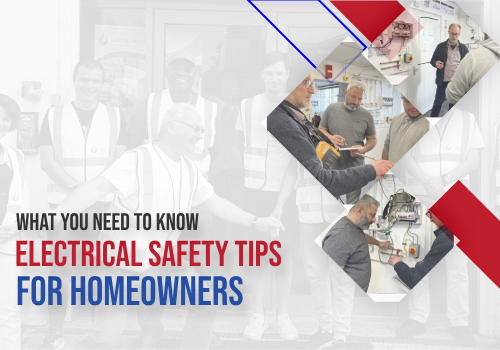

Electrical safety is paramount when it comes to homeownership. Understanding the basics of electrical systems and following proper safety practices can help prevent accidents, injuries, and even fires.
Before diving into specific safety tips, it’s crucial to grasp the fundamentals of electrical systems. Homeowners should have a basic understanding of sockets, electrical circuits, and common electrical terms. This knowledge allows you to make informed decisions and ensures you use your electrical system correctly and safely. Familiarise yourself with terms like wattage, voltage, and current, as they play a significant role in electrical safety.
One common mistake homeowners make is overloading sockets. Plugging too many appliances into a single socket can cause overheating and potential electrical hazards. To avoid this, distribute your electrical load evenly across multiple sockets. Additionally, using extension cords should be done cautiously. Ensure that extension cords are in good condition, and never run them under carpets or across doorways where they can pose a tripping hazard. Lastly, make it a habit to unplug appliances when they’re not in use, reducing the risk of electrical accidents.
Regularly inspecting your electrical system for potential hazards is essential for maintaining a safe home environment. Check cords and plugs for any signs of damage, such as fraying or exposed wires. Damaged cords can lead to electrical shocks and even fires. It’s also important to be cautious of water near electrical sources, such as sinks, bathtubs, and outdoor areas. Keeping electrical equipment away from water minimises the risk of electrocution. Familiarise yourself with warning signs of electrical problems, such as flickering lights or frequently tripped circuit breakers, and address them promptly.
Residual Current Devices (RCDs) play a crucial role in electrical safety. These devices monitor the flow of electricity and can quickly shut off power in the event of an electrical fault, preventing potential electric shocks or fires. It is recommended to have RCDs installed in your electrical distribution board to provide an additional layer of protection. Testing RCDs regularly is important to ensure they are functioning correctly and providing the intended safety benefits.
While it’s great to have a basic understanding of electrical systems, there are situations where calling a qualified electrician is necessary. Electrical issues such as frequent power surges, sparking outlets, or circuit breakers that trip frequently should be addressed by professionals. Attempting to fix complex electrical problems without the required knowledge and expertise can lead to further complications or even accidents. Hiring a qualified electrician for inspections, repairs, and installations ensures the work is done safely and up to code.
Let’s delve into the price difference between homeowners learning electrical courses and calling an electrician, using a real-life example in the UK.
When faced with electrical issues at home, homeowners often find themselves contemplating whether to hire a qualified electrician or learn electrical skills through training courses. Both options have their merits, but they come with different price considerations.
Calling a qualified electrician is undoubtedly convenient, as they possess the expertise to diagnose and resolve complex electrical problems. However, their services come at a cost. In the UK, electricians typically charge an hourly rate ranging from £40 to £70, depending on factors such as location, the complexity of the job, and the electrician’s experience. For larger projects or emergency call-outs, the expenses can quickly add up.
On the other hand, homeowners can choose to learn electrical skills through training courses. These courses provide valuable knowledge and hands-on experience, allowing individuals to handle minor electrical repairs and installations independently. The cost of electrical training courses varies depending on the level of expertise offered and the training provider. In the UK, basic electrical courses can range from £149 to £1069, while more comprehensive programs can range from £1,100 to £8599
To put this into perspective, let’s consider an example. Suppose a homeowner experiences a recurring issue with a malfunctioning light switch in their living room. They contact a local electrician, who quotes an estimated repair cost of £150. However, the homeowner decides to enrol in a basic electrical training course instead, which costs £1099
Although the initial cost of the training course may seem higher than the electrician’s quote, it’s essential to consider the long-term financial benefit. By learning how to diagnose and fix minor electrical issues, the homeowner gains the ability to address similar problems in the future without the need to hire an electrician. Over time, this can result in substantial savings.
Moreover, having electrical skills allows homeowners to take on additional electrical projects, such as installing new light fixtures or outlets. By doing these tasks themselves, homeowners can avoid the expense of hiring an electrician for each individual job. The cumulative savings can be significant, especially for those who enjoy tackling DIY projects around the house.
Few of the courses homeowners can apply at Learn Trade Skills:
If you’re a homeowner and would like to carry out general electrical work around the property then this course is for you. This will enable you to learn the basics of domestic installation and you will even be able to install sockets, lights, cookers and many other circuits usually found within domestic properties.
Intermediate Electricians Course Package
Upon completing the Intermediate Package, homeowners will be able to learn the basics of domestic installation, be able to install sockets, lighting, cookers, and other circuits used within domestic properties.
Homeowners will also be able to certify their home with a full rewiring and inspect, test, and verify in their home.
Going the Extra Mile: Professional Package
This course will provide you with the certification needed to complete EICR Reports and even specialise in other areas such as EV Charging Port Installation.
Conclusion:
Maintaining electrical safety in your home should be a top priority as a homeowner. By understanding the basics of electrical systems, practising proper socket usage, identifying potential hazards, installing RCDs, and knowing when to call a qualified electrician, you can ensure the safety of yourself and your loved ones. Additionally, considering learning basic electrical skills through training or courses can empower you to handle minor electrical tasks confidently. Remember, electrical safety is not something to be taken lightly, so always prioritise caution and seek professional help when needed.
FAQs
Tolga Aramaz is the Director of Learn Trade Skills (LTS), a family-run training centre specialising in electrical installations. With years of experience and a deep understanding of the electrical industry, Tolga is known for their exceptional organisational skills, attention to detail, and commitment to delivering outstanding results. They provide valuable insights and guidance to electricians, contractors, and businesses, ensuring compliance with industry regulations and safety protocols. Through engaging training programmes and consultancy services, Tolga empowers professionals to excel in their roles, fostering long-term relationships built on professionalism and customer satisfaction.



© Copyright Learn Trade Skills 2025
“Lorem ipsum dolor sit amet, consectetur adipiscing elit. Ut pretium tristique purus nec consectetur. Nulla feugiat eget tellus aliquam scelerisque. Sed eget luctus enim, sed mattis enim. Lorem ipsum dolor sit amet, consectetur adipiscing elit. Ut pretium tristique purus nec consectetur. Nulla feugiat eget tellus aliquam scelerisque. Sed eget luctus enim, sed mattis enim.Nulla feugiat eget tellus aliquam scelerisque. Sed eget luctus enim, sed mattis enim. Lorem ipsum dolor sit amet, consectetur adipiscing elit. Ut pretium tristique purus nec consectetur. Nulla feugiat eget tellus aliquam scelerisque. Sed eget luctus enim, sed mattis enim.”
William Goss
Electrician course
11/11/2024